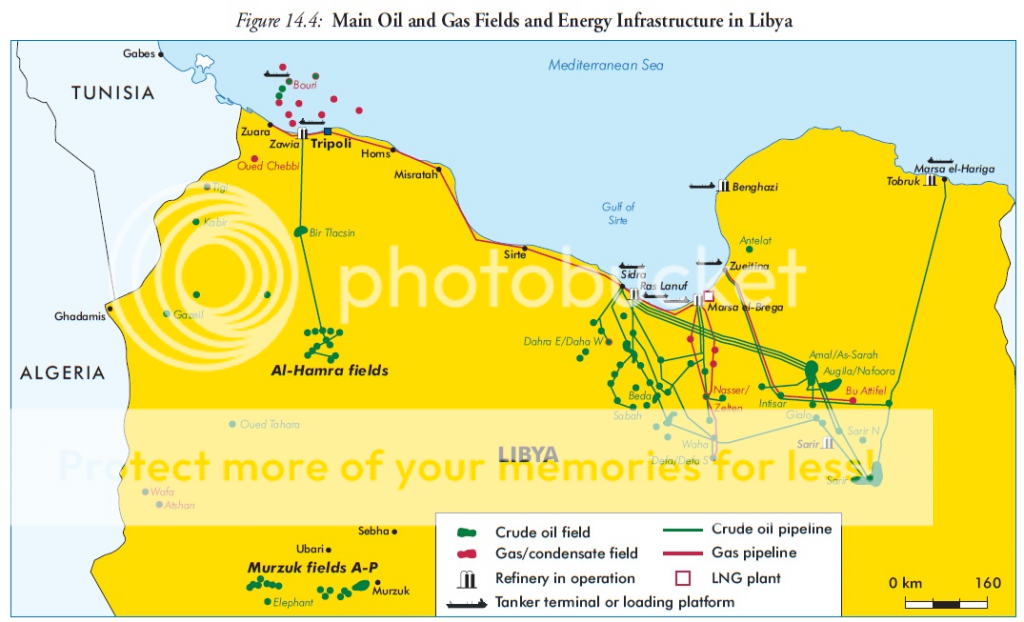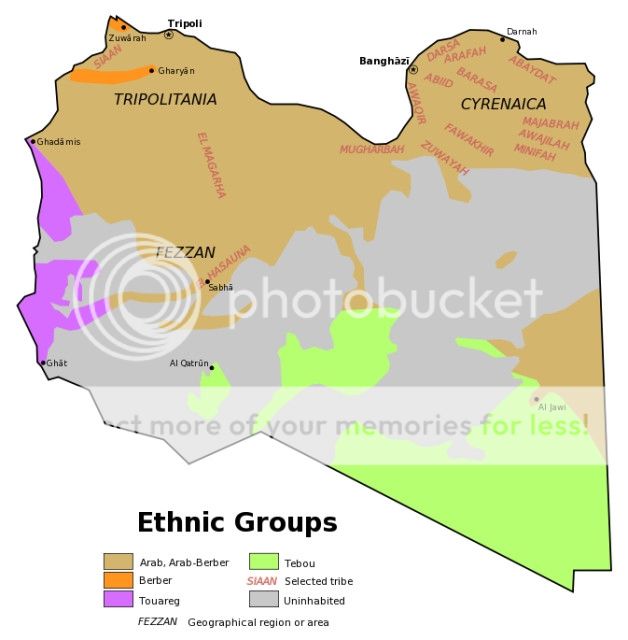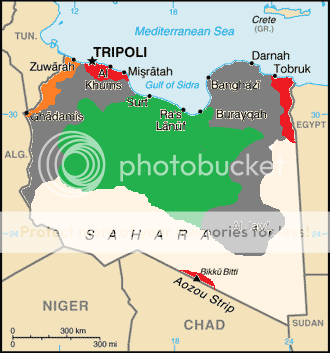THE WORLD AFTER ZHIRINOVSKY: THE MAGHREB
Ok folks, a little Christmas present for you guys. A short spin off of Zhirinovsky's Russian Empire. It's just a one day thing, and if I don't get "Bleeding Florida" up soon Unknown will drive down to New Mexico and throw things at me. But I didn't want to post Bleeding Florida before the new year's, and I figured this would be something that a few of you might be interested in...
So, what we have here is a look at how TTLs Arab Spring ends up, as well as a little bit of info on Engler (I've had a few requests there) and Lebed's Presidency. And we see that in Libya, things are...well, a mess.
Some new names in this update:
Ansar al-Sharia:
http://en.wikipedia.org/wiki/Ansar_al-Sharia_(Libya)
Info on Gaddafi's use of African Mercs during the civil war:
http://www.theguardian.com/world/2011/feb/22/gaddafi-mercenary-force-libya
Info on the location of oil fields in Libya:
http://crudeoilpeak.info/wp-content/uploads/2011/04/Libya_Oil_Gas_Fields_WEO_2005.jpg
Brega:
http://en.wikipedia.org/wiki/Brega
Ajdabiya:
http://en.wikipedia.org/wiki/Ajdabiya
Zuwarah:
http://en.wikipedia.org/wiki/Zuwarah
Saif Al-Islam Gaddafi:
http://en.wikipedia.org/wiki/Saif_al-Islam_Gaddafi
Warfalla Tribe:
http://en.wikipedia.org/wiki/Warfalla
Ghadames:
http://en.wikipedia.org/wiki/Ghadames
Some info on Berber-Arab relations in Libya and Algeria:
http://www.cnn.com/2012/09/03/world/meast/libya-berber-amazigh-renaissance/
Flag of Amazigh (Berber):
http://www.bbc.com/news/world-africa-14650257
_____________________________________________________
Radical Islamic forces continue to pound Ghadamis as Berber community fear “genocide”
Last Updated: Friday, October 10, 2010 | 4:52 PM ET
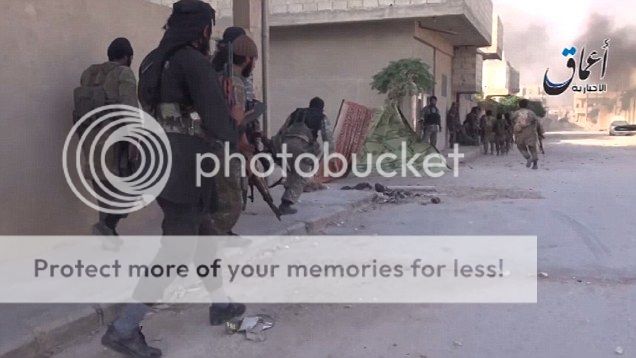
(Reuters) – Radical Islamic forces look poised to seize the village of Ghadamis near the border with Tunisia as local Berbers continue to call on the international community to stop the “coming genocide.”
“They will kill us all,” Ghadamis resident Mohammed Mourad told reporters as he fled across the border into Tunisia. “They will not stop until every Berber is dead.”
It is estimated that the radical jihadist group known as “Ansar al-Sharia” is now in control of over 25% of the village, including the historic old town. Ansar al-Sharia, which is also often referred to as “al-Harakat” (or the movement) first emerged in 2005 when they seized the city of Benghazi in a lightning raid that stunned Libyans and the international community. Thirty-five Americans and Westerners in the city were killed after the fall of Benghazi.
“Their power is through terror,” former American ambassador Chris Johnson said in an interview with the BBC last week, “and they are appealing to many disenfranchised Muslims the world over. But their radical interpretation of Islam has alienated many Libyans, including the secular Berbers.”
Clashes between Berbers and al-Harakat began in 2005 as well, after the long persecuted Berbers began to take advantage of the power vacuum in Libya to reestablish their own national identity. In the city of Zuwarah, the predominant Berber population quickly reestablished the Berber language and even began to fly the flag of Amazigh over government buildings, much to the chagrin of the central government in Tripoli.
“Under Kaddafi the Berbers were badly oppressed,” Johnson added, “their language was outlawed and their cultural traditions were prohibited. Once Kaddafi fell, they seized the opportunity to reestablish their culture.”
By 2005, with Libya descending into a deadly civil war, relations between the Berbers and Arabs boiled over.
“Race became an issue in Libya for the first time,” former American ambassador Chris Johnson said in an interview with the BBC last week, “it became even more controlling than tribalism. Libya was soon flooded with radical jihadists who could care less about what tribe you belonged to. They only cared about your religion and if what faction you backed. And in that regard the Berbers were seen as too secular, and very dangerous.”
Republicans slam Kennedy over “inaction” in Libya
In an interview on Fox News, former Vice President Elizabeth Dole slammed the man who defeated her in 2008, calling President Kennedy’s foreign policy in Libya “a complete mess.”
“We cannot ignore the plight of these innocent people in Ghadamis,” Dole said, “this is a moment that will very much define President Kennedy, and he needs to take steps to stop these radical jihadist from taking over the rest of the country. Right now over 90% of Libya is either controlled by radical Jihadist groups or by African troops loyal to Moscow. It is time for the United States to act.”
_____________________________________________________________
CNN interview with Dick Gephardt, Former House Majority Leader
July 26, 2010
CNN: Congressman Gephardt, President Kennedy was highly critical of President Engler’s handling of the crisis in Libya, calling it “weak and short sighted.” However, in the last two years the insurgency in Libya has exploded into a terrifying civil war that has killed over two hundred thousand people. Over 70% of Americans polled disapprove of President Kennedy’s handing of the war in Libya. Do you feel that he has made mistakes in regards to his handling of Libya?
Gephardt: Yes and no. For one thing, I really don’t feel that anyone really feels that Libya was dealing with only an “insurgency” after the fall of Benghazi in 2005. It was a civil war then, and it has remained so since. But to answer your question, many Republicans and Democrats alike were shocked and deeply stunned when President Engler announced that he was pulling U.S. personnel and peacekeepers out of Libya after the fall of Benghazi. He tried to defend it by comparing it to Ronald Reagan’s withdrawal of U.S. troops from Beirut back in 1982, but to a lot of us it looked like he was being railroaded by the libertarian wing of the Republican Party. Within a week the terrorist army of al-Harakat seized our abandoned embassy complex in Tripoli and proclaimed it their headquarters. They then set fire to flags and some portraits of President Engler that were left behind, something that was broadcast on every news network all over the world. We gave them a shot of adrenaline at that moment; we gave them legitimacy in the eyes of many radical Muslims.
CNN: Most Americans felt that Engler did the right thing at the time in withdrawing from Libya. Few were eager to get bogged down in another conflict in the Middle East while we were still looking for Osama Bin Laden in Afghanistan and also sending troops into Iraq. And considering the UIS announced they were sending troops to Libya, it only hardened American opposition to sending troops into Libya.
Gephardt: And I never said send troops in. But airstrikes, real air strikes and not simply bombing our old embassy complex, would have castrated al-Harakat before they grew into the force they are today. But President Engler was never willing to push back against the UIS.
CNN: But the violence and the anarchy had only increased in the last two years. And like his predecessor, President Kennedy seems unwilling to commit troops to the region.
Gephardt: I know some Democrats have come out against President Kennedy’s handling of the crisis in Libya. I do think we should have more of a presence in the region, in particular with air strikes. But Libya was a simmering pot that finally boiled over last year.
_____________________________________________________________
Excerpts from the book “Come Hell or High Water: The Making of the Engler Presidency” by Carlton Williams.
Published by Random House © 2011
CHAPTER NINE: BEIRUT OR BUSH
By mid-2005 the skyrocketing poll numbers and bipartisan support for president Engler finally began to ebb. Although Engler was widely popular with Americans, with some polls having his approval ratings hovering around 80%, he was ultimately making enemies across the aisle as his began to push a more conservative economic agenda while also alienating many Republicans with his foreign policy.
“I don’t think any politician better summed up the phrase only Nixon could go to China better than President Engler,” commented former Tennessee Senator and U.S. Attorney General Lamar Alexander. “He had the gravitas early on to force his will on both parties. But once there was a crack in the dam, his opponents tried to seize the opportunity and knock him down a notch.”
The opportunity came in 2005 when Libya, a country that had struggled to maintain stability ever since the fall of Muammar Gaddafi, finally erupted into a civil war. After the United States began to bomb militias in Iraq with ties to al-Qaeda in early 2005, protests erupted across the Middle East with millions of Muslims condemning the move. But in Benghazi, where central government control was tenuous at best, anti-American protests soon spiraled into anarchy as the previously unknown terrorist group known as Ansar al-Sharia seized several Western and UIS businesses as well as the local police station. After executing an American employed by Chevron and broadcasting the execution on the internet, President Engler made the controversial decision to disengage from Libya.
“We discussed it with Secretary of State Colin Powell and we were all in agreement that Libya was a hornet’s nest and that we didn’t need to further stir the pot by sending in troops. We had troops in Afghanistan as part of a joint mission with the UIS. Then we sent the military into Iraq, again as part of a join operation with the UIS. We were agitating the entire region and we believed that if we sent American soldiers into Benghazi there would be a thousand other Benghazi’s before the end of the year.”
Several members of former President George W. Bush’s inner circle were openly clamoring for the United States to go into Libya and rout out the terrorists, something that put the President in a difficult position within his own party.
“He called the decision Beirut or Bush,” Alexander added. “Do we go in like George Bush’s cabinet wanted? Or do we pull out like Ronald Regan did in Beirut in 1982? At the end of the day, he elected to withdraw American troops and embassy personnel from Libya, a decision that has at times haunted him.”
The withdrawal of American peacekeepers (part of a small contingency of 100 that had been sent to the country by the UN shortly after the fall of Gaddafi) as well as the closure of the American embassy did initially embolden the little known terrorist organization that was regarded as little more than a radical offshoot of al-Qaeda. But across the globe the UIS was deeply troubled by the lawlessness in Libya, and also saw an opportunity to expand their control of the international oil market. Lost in the shuffle was the status of the city of Sirte, which saw a most unlikely figure reemerge. After the city fell to anti-Gaddafi rebels in 2002, it was looted by the angry rebels who long associated the opulence of the city with the cronyism of the Gaddafi regime. But within months it soon reemerged as a stronghold of the pro-Gaddafi resistance that regarded the new government in Tripoli with contempt.
“Several members of Gaddafi’s Warfalla tribe seized his son, Saif al-Islam Gaddafi, shortly after the elder Gaddafi was executed in Tripoli,” commented Alex Smith, former advisor to the Pentagon. “But although Saif was under arrest in Sirte, they refused to turn him over to the transitional government. This ultimately turned Sirte into ground zero for the pro-Gaddafi resistance.”
By early 2005 the new government in Tripoli had lost control of Sirte as thousands of Gaddafi loyalists soon flooded into the city. By March of 2005 tensions finally boiled over.
“When Benghazi erupted the Gaddafi-loyalist stormed the local police station in Sirte and liberated Saif Al-Islam Gaddafi,” Smith added. “It soon triggered a relentless assault on Sirte by the central government, who seemed almost disinterested in Benghazi.”
The fierce assault on Sirte, a city that had already been badly damaged by the revolution in 2002, only emboldened the rebels. And on April 1, they received support from a valuable ally.
“UIS President Alexander Lebed announced that the UIS was recognizing the Gaddafi “transitional government,” Smith said. “Once they did that there was no hope for Libya.”
Within a week of the capture of Sirte the resurgent Gaddafi regime would receive aid from the most unlikely place as mercenaries with the International Strategic Resource Group flooded into the city. And by the end of the year the Russian Foreign Legion would be in de facto control of nearly half of the country.
____________________________________________________________
"The new face of apartheid: African mercenaries in the Maghreb "
Foreign Affairs (5/04/14)
by William Hason
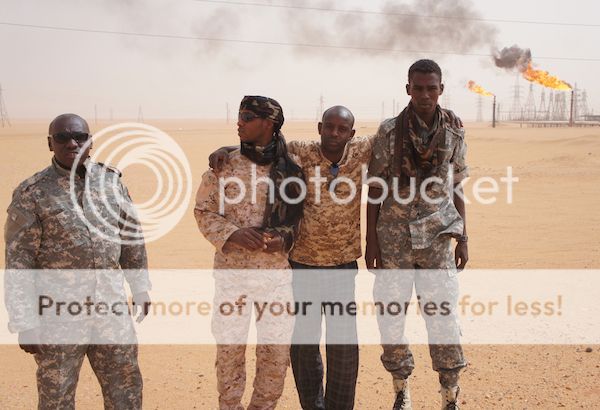
Moses Ncita bristles at the comparison even before I ask him the question.
“Jimmy Carter can go to Hell,” he says angrily, “I lived through apartheid! I experienced it every day as a child! But to him it is a word to be casually thrown around. Israel is an apartheid state?! Libya is an apartheid state?! Well he can go to Hell!”
Several pedestrians look in his general direction but say nothing. A few nod their head in approval. All of them are black.
“We are the victim of terrorism everyday and we have to take steps to protect ourselves and our families,” Ncita said as we pass by a sign hanging over a restroom sign in the small, dusty oil town of Brega in northern Libya. The town boasted a pre war population of nearly 7,000, but now sees its population stand at nearly twice than amount. However, its growth has come at a price. Over 90% of the town is now inhabited by members of the International Strategic Resource Group and Executive Outcomes, a mercenary army with strong ties to the UIS government. In fact, over half of the mercenaries are dual citizens of the UIS and their home country.
“As soon as we took control of Sirte in 2005 we formulated a strategy to restore the legitimate government of Libya,” Ncita added. “Secure Brega to the east, Muzrak to the south, and Al-Hamra to the west. We accomplished all three and castrated the opposition.”
The strategy was simple, but brutally efficient. Capture the oil fields of Libya and cut off the major source of income for the nation. But the importance of both Brega and the Sirte Basin was not lost on what was quickly emerging as the two leading opposition forces in the country: the struggling “Transitional Government of National Unity” and the suddenly resurgent Ansar al-Sharia, which captured several key towns in 2005, including Benghazi. Although their ability to hold territory was initially weak, they proved to be a dangerous foe.
“We perhaps underestimated them,” Ncita admitted, “the Libyan National Army was trying desperately to dislodge us, and they were focusing almost exclusively on the government forces. We saw them as doing our dirty work. But alas, once they gained enough strength, they struck.”
In July of 2008, the shaky and unwritten ceasefire came to an end when forces loyal to Ansar al-Sharia seized the city of Ajdabiya in a lightning raid that caught many of the Africans off guard.
“Although Ansar al-Sharia was unable to defeat the government forces in the western part of the country, the fact that we controlled the center of the nation allowed them to consolidate power in the east. We weren’t fighting with them directly, and we underestimated the threat…to our detriment.”
The fall of the Gaddafi held city of Ajdabiya led to an orgy of violence against the thousands of black Africans who had made Ajdabiya their home. Videos soon surfaced all over the internet of atrocities committed by the predominantly Arab jihadist against the predominantly black mercenaries. Hundreds were seen being loaded up on the back of Toyota pickup trucks begging for their lives, and before long even more disturbing videos would emerge.
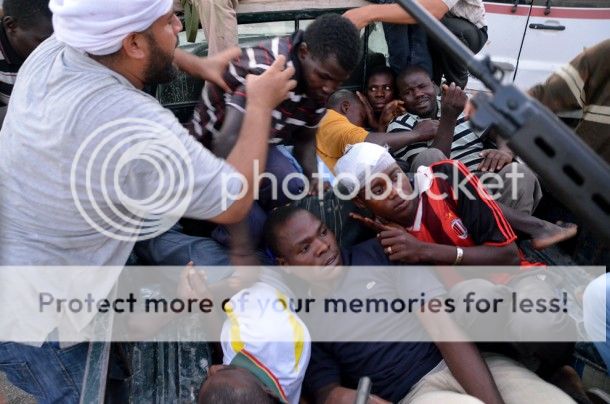
“I saw several friends on those videos,” Ncita admitted, “people I knew…friends. To see them executed in such barbaric fashion was horrifying.”
Videos of mass-executions soon exploded across the internet, but as is often the case with brutality, it had the unintended consequence of emboldening those that it meant to terrify.
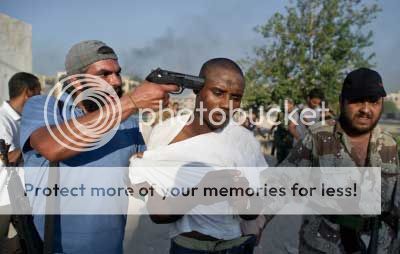
“Many of the mercenaries were getting burned out in Libya,” Ncita admitted. “Most were dual citizens of the UIS and they had made a small fortune selling Libyan oil on the black market, or by shutting down the oil industry entirely. The UIS didn’t care so much if Libya was producing oil or not, they just cared about manipulating Libya’s output to prevent the overall price of oil to drop. But after Ajdabiya it changed. Everything changed. This was now our home, and we were not going to let them drive us from it.”
The Battle of Brega soon followed, and although the ISRG-EO was able to repeal the radical jihadist army, they were unable to dislodge them from Ajdabiya until 2010. But by then Ansar al-Sharia began a campaign of terror to try and shake the will of the mercenaries.
“We all lived in Brega,” Ncita added, “many of us brought our families with us. We had homes and cars and money and lived the life we never had back in Johannesburg, or Monrovia, or Kinshasa. But then the Arabs began to target us.”
Terrorist attacks became a weekly occurrence, with bus bombings becoming shockingly commonplace.
“I remember when they set off a bomb on a school bus,” Ncita said sadly, “a dozen children killed because the bus driver was a terrorist.”
Weekly bombings at discothèques, gas stations, and even schools made the town virtually unlivable, as all thirty public buses were destroyed in a six week stretch. But in response to the terrorist threat, the UIS backed militia did something that proved highly controversial: they instituted a series of ordinances that turned the Sirte Basin into a literal apartheid state. Arabs were forced out of town like Brega en masse, and in the liberated city of Ajdabiya, a series of prohibitions were enacted. These prohibitions seemed to be based on the very system of apartheid that men like Moses Ncita spent their whole lives fighting against. Signs prohibiting Arabs from entering buildings would soon pop up all over the city, as well as separate buses for “Arabs only.” When terrorists switched to car bombs pulling up next to military vehicles, the entire Arab population of Ajdabiya was prohibited from driving any motor vehicle whatsoever.
“The jihadists already prohibited their women from driving,” Ncita spat out angrily, “we just expanded it to include Arab men also.”
The targeting of anyone with lighter skin may have led to security in Brega, but it has led to more violence across the country and has, ironically enough, helped to weaken the central government. It is estimated that the government has now lost control of over 90% of the country to over a dozen groups, including the mercenaries who nominally back Saif Al-Islam Gaddafi and the terrorists who back Ansar Al-Sharia.
“Most of the fighters with Ansar Al-Sharia are foreigners also,” Ncita added, “they come from Syria, and Tunisia, and even England. And look what they do to people in the towns they control?! But nobody cares about that. No, just us, and how we make Arabs ride their own bus so we don’t have to worry if they are a terrorist or not.”
Despite earning criticism from numerous human rights groups and former US President Jimmy Carter, the mercenaries of Libya appear well entrenched. In fact, in much of central Libya they make up the overwhelming majority. But for men like Moses Ncita, even the true nature of their presence in Libya is at times hard to deny. Walking past a sign that says “no Arabs allowed” Ncita reflects, for just a moment, on how his life has come full circle.
“I remember talking to a friend of mine from Rwanda who fought here a few years ago.” Ncita admitted. “He was amazed at how just a dozen years ago he was hiding under his bed hoping that the Hutus didn’t kill him. He remembered how it was a Muslim reporter from Britain that saved his life and snuck him out of the country. He later became part of the “Libyan Federal Police Force-Anti Terrorism Unit,” a unit whose sole purpose was to find radical jihadists and to…eliminate the threat they posed. He found these three Chechens and this Pakistani that day…they were hiding in a closet in the home of this Arab with suspected terrorist ties. Well, we automatically kill all the Chechens and Pakistanis we find. We know that the only reason that a Chechen would be in Libya is to fight with the terrorists. But he told me something that really stayed with me. He said the Pakistani boy looked just like the Pakistani reporter who saved his life. He even had a similar scar on his eyebrow that looked like it came from a boxing match. He knew it wasn’t the same man, it couldn’t be. This boy was maybe 19-years old. But he couldn’t get that mans face out of his mind while he strangled the terrorist with a piano wire and by the end of it he was weeping. He said he realized that he had become the monster that he grew up fearing…that he was no better than the Hutus. He said he just wanted to go home….that he was done with the violence and the killing. I called him a silly old woman, but I won’t lie. Sometimes I wonder if he was onto something. A victim can also become a perpetrator if he can’t control the hate in his heart. Victimhood doesn’t make you immune to evil. Sometimes I wonder…are we all just monsters now?”
